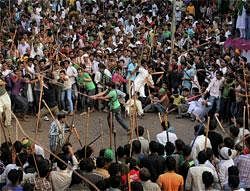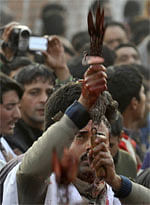

In Delhi, thousands of Muslims took out processions at many places to observe the day, also known as Yaum-e-Ashura, the day of enlightenment, which is an important date in the Islamic calendar.
Muslims believe that many key events in Islamic history occurred on the day, including the events of Karbala.
Holding flags and dressed in black, men and women, mostly belonging to the Shia sect -- who along with Sunnis make up India's 140 million Muslims -- took out processions, crying and beating their chests in the ceremonial "maatam" or mourning.
Barefoot men with blades and other sharp-edged weapons flagellated themselves and recited elegies in the memory of Hussain.
Delhi Police had put in place security measures to ensure that the day passes off peacefully as it also coincided with the 1992 Babri Masjid demolition anniversary.
"We had taken enough security measures for the processions in Delhi, like every other year. It was a peaceful day," Delhi Police spokesperson Rajan Bhagat told IANS.
The processions were taken out between mosques -- from Shia Jama Masjid in Kashmere Gate to Punja Sharif Karbala in the same locality and from Pahari Bhojla in Chittqualam near the historic Jama Masjid to Karbala in Jorbagh near Lodhi Road.
Special prayers were offered at the historic Shahi Masjid Fatehpuri and Khwaja Nizam-ud-din Auliya's shrine in south Delhi, where Muslims paid homage to Hussain.
Processions were also taken out in Muslim-dominated areas of Uttar Pradesh, West Bengal, Maharashtra and West Bengal.
In Srinagar, the Jammu and Kashmir government has banned the procession since the early 1990s for security reasons. However, Shia Muslims still carry out small processions in the interiors of the old city.
The authorities imposed restrictions in city centre Lal Chowk and some adjacent areas in Srinagar to maintain law and order. Shops and businesses were closed and vehicular traffic and pedestrian movement remained suspended in Srinagar.
In Hyderabad, a mood of mourning pervaded the old city areas. Cries of "Ya Hussain, Ya Hussain" rent the air as blood oozed out of the heads and chests of the bare-chested mourners.
In Lucknow, a large number of Shia Muslims, in black clothes, marched beating their chests and backs with chains and small knives to feel the same pain that, they believe, was felt by Hussain and his relatives.
It was during the month of Muharram in 680 AD that soldiers of the ruling caliph Yazid surrounded Hussain, his family and some of his followers at Karbala. In the days that followed, they were denied food and water and many of them were systematically killed.
Hussain was killed on the 10th day which is observed as the day of mourning.
On Muharram, considered a day of bereavement, Muslims observe voluntary fasts, give to charity and pray in remembrance of Hussain.
India has the third largest population of Muslims in the world, after Indonesia and Pakistan.